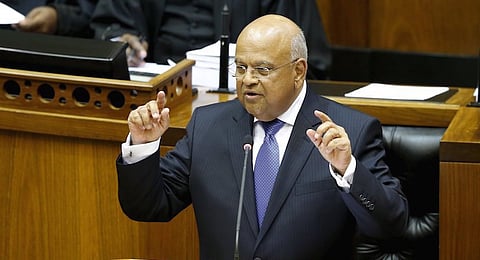Pravin using crisis to reverse SA’s fiscal drift, align with business
By Alec Hogg*
The 2016 Budget proposals show us reinstated South Africa's Finance Minister Pravin Gordhan must have concluded a hard bargain before accepting what could have been a hospital pass after Nenegate.
The now "unfireable" head of National Treasury has driven a stake into the ever expanding public sector, attacking State's profligacy with a vigour not seen since the early days of democracy.
Gordhan has promised to progressively reduce Government spending through improving its value for money, attacking patronage networks in, especially, State Enterprises, and eliminating widespread tender corruption.
During his first term Gordhan agitated for and eventually installed a Procurement Tzar whose purpose is to oversee and standardise costs on the R500bn a year which Government spends, often poorly.
This Budget gives the Chief Procurement Office additional power and takes bidding and tender processes to a new level of transparency. Gordhan is so confident that he now has the right system in place that he has budgeted to strip out R25bn a year in savings.
Gordhan is also determined to fully use his opportunity to impose frugality. When he tried two years ago, he lasted only a few months before being "redeployed" in a lesser portfolio.
This time around he is confident of a very different outcome.
At the traditional Press Conference during the pre-Budget "lock-up" this morning, Gordhan said there is unanimity within the ANC that the country is facing a crisis, one that requires that the nettle is grasped.
He referred a few times to recent meetings between senior politicians and business leaders, hinting that corporate South Africa's massive cash piles will soon be unlocked.
Gordhan's four point plan is, he says, rather radical.
First is fiscal consolidation through a R33bn swing on Government's bottom line since the October Mini Budget (R15bn less spending; R18bn more tax).
Second is the commitment to developing the new partnership with SA business – "we're heading in the same direction now." He still talks of the Developmental State, but one that is built through a cohesive programme that business buys into.
Third is addressing policy uncertainty which has hurt economic growth. The "dragging out" of the Minerals Bill is being urgently addressed; ditto the energy proposals, including clarity on the controversial nuclear programme, which will only go ahead at a rate and costs the country can afford.
The fourth point will resonate with business leaders like former JSE chief executive and erstwhile SAA director Russell Loubser. Says Gordhan: "There was a view that State Owned Enterprises were sacrosanct. That's no longer the case. We are starting to take a tough look at them and their operational efficiencies."
Among the priorities is a "new, stronger" board at SAA, due to be announced in the next few weeks. But it's not just the SAA directors who are being scrutinised. Gordhan says all the SOE boards are being reviewed – "the number of people there, and the fees they are being paid."
There were more than 120 journalists in both Cape Town and Pretoria given an embargoed look at the Budget details ahead of the general public. Gordhan thanks us for turning out in such big numbers to welcome back the "new old guy".
He came over confidently and even showed glimpses of his well-known sense of humour. Including when asked whether he actually has the political support to push through proposals that would definitely not have flown in any previous year of the Zuma Administration's rule.
Gordhan quipped: "These are not ideas I came up with yesterday. We've discussed them widely and agreed them before coming here. Do I have political support? If you see me sitting here in October (for the Mini Budget) then I do. If not, then I don't. It does help, though, that we all know (within the ANC) we are in a crisis. And that we need to do extraordinary things to get out of it."
There is no doubt that in ANC terms, cutting spending growth to well below the rise in income, dropping public sector personnel and becoming brutally open on tender processes is "extraordinary."
But whether it is enough to prevent the looming slide in the credit rating to junk status remains uncertain. Fiscal discipline is only one part of the equation. The other one is much higher economic growth, which must lift the 0.9% projected for this year and only slightly more in 2017.
Gordhan is betting the business sector will end its scepticism and come to the party. He has done more to encourage them than any other ANC politician in the past decade. Hopefully they will meet at least half way.
- Alec Hogg is the editor in chief of Biznews.com

